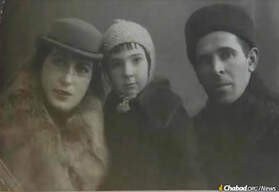 This year’s Holocaust Remembrance Day falls today, 28 April. Yom HaShoah is a national holiday in Israel held on or just before the 27the day of Nisan in the Hebrew calendar. The date marks the anniversary of the Warsaw Ghetto Uprising in 1943, when Jewish resistance fighters attempted to halt the Nazis’ final effort to transport the city’s remaining Jews to the death camps at Treblinka and Majdanek, the largest single revolt by Jews during World War II. Further east, in Soviet Ukraine, the Holocaust took a different form. Rather than ghettos and concentration camps, the Nazis used bullets and executions in mass graves on the outskirts of towns and villages. Vanda Semyonovna Obiedkova lived in Zhdanov, a city in eastern Ukraine named after the Soviet politician Andrei Zhdanov. Ten-year-old Vanda hid in a basement when the SS came to take away her mother after the Germans invaded in October 1941. On 20 October 1941, the Nazis executed up to 16,000 Jews in pits dug on the outskirts of the city, including Vanda’s mother and all her mother’s family. The SS later found Vanda and detained her, but family friends were able to convince them that the little girl was Greek, rather than Jewish. Her father, a non-Jew, managed to get her admitted to a hospital, where she remained until the liberation of Zhdanov in 1943. Today Zhdanov is known as Mariupol. In a haunting echo of her escape from the Nazis more than 80 years ago, 91-year-old Vanda was forced once again to hide in a basement when the Russian army began bombing the city in early March. She died there on 4 April. “There was no water, no electricity, no heat — and it was unbearably cold,” her daughter Larissa told Dovid Margolin in an interview with Chabad.org. Although Larissa tried to care for her mother, “there was nothing we could do for her. We were living like animals,” she said. It was too dangerous even to go out to find water as two snipers had set up positions near the closest water supply. “Every time a bomb fell, the entire building shook,” Larissa said. “My mother kept saying she didn’t remember anything like this during World War II… Mama didn’t deserve such a death”. In her final two weeks, Vanda was no longer able to stand. She lay freezing and pleading for water, asking, “Why is this happening?”. Larissa and her husband dodged the shelling to bury her in a public park near the Sea of Azov. “Mama loved Mariupol; she never wanted to leave,” she said. Vanda gave an interview to the USC Shoah Foundation in 1998, documenting her life story and Holocaust experience. “We had a VHS tape of her interview at home,” Larissa said, “but that’s all burned, together with our home.” In 2014, when fighting broke out in Mariupol as Russian separatists threatened to take the city, Larissa and her family – along with many of the city’s Jews – were evacuated to Zhitomir, in the west of the country, with the help of Rabbi Mendel Cohen, the city’s only rabbi and director of Chabad-Lubavitch in Mariupol. The family returned after Ukrainian troops secured the city, but Larissa said there’s no going back this time. She and her family were evacuated by Rabbi Cohen for a second time after her mother’s death. “I’m so sorry for the people of Mariupol. There’s no city, no work, no home — nothing. What is there to return to? For what? It’s all gone. Our parents wanted us to live better than they did, but here we are repeating their lives again,” she said. Vanda is the second Holocaust survivor known to have died in the war in Ukraine, after 96-year-old Boris Romanchenko, who was killed during a Russian attack on Kharkiv. He survived the Nazi concentration camps of Buchenwald and Bergen Belsen. The full interview is available here Photo of Vanda and her parents published with permission of Chabad.org
0 Comments
Leave a Reply. |
Keeping stories aliveThis blog aims to discuss historical events relating to the Jewish communities of Ukraine, and of Eastern Europe more widely. As a storyteller, I hope to keep alive stories of the past and remember those who told or experienced them. Like so many others, I am deeply troubled by the war in Ukraine and for the foreseeable future, most articles published here will focus on the war, with an emphasis on parallels with other tumultuous periods in Ukraine's tragic history. Archives
March 2024
Categories
All
|
 RSS Feed
RSS Feed
